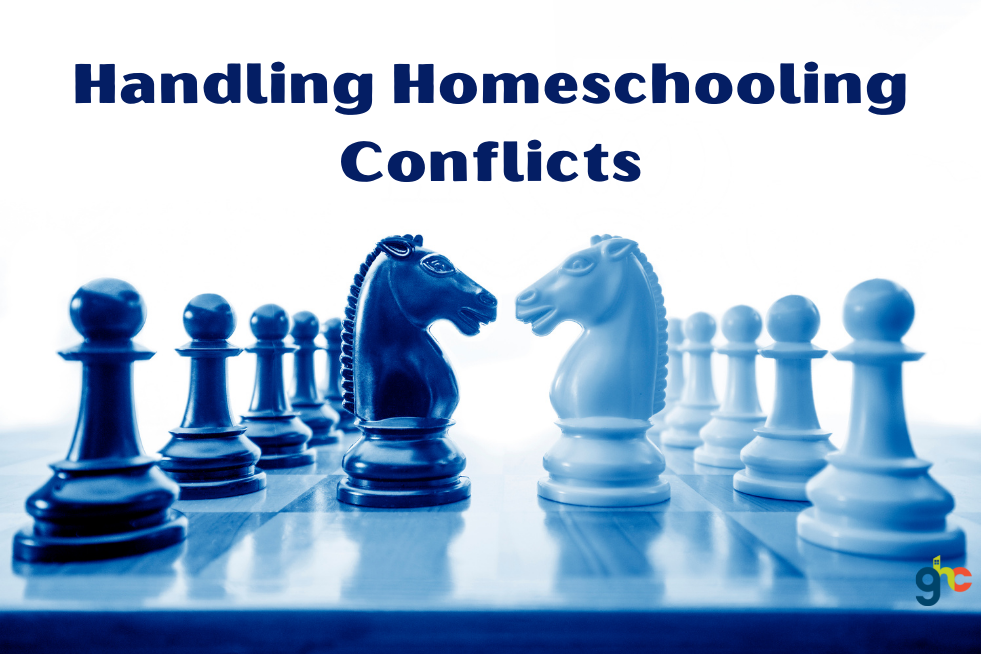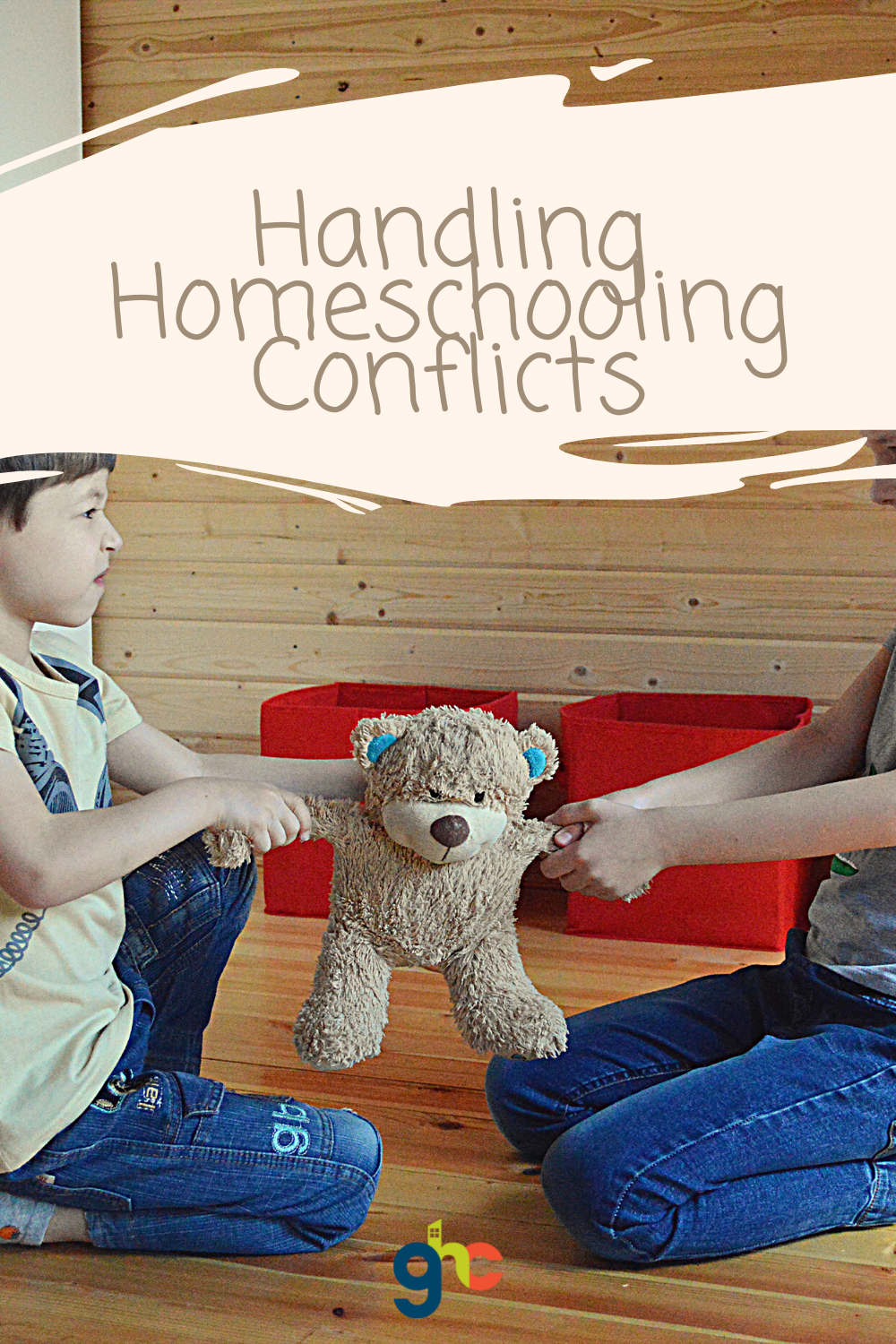One thing is for sure in homeschooling: conflicts will come. We’re not always sure how, or when, or on what magnitude, but they’ll show up almost every school year. As educators, it's good to have thought about that far ahead of time. A specific game plan on how to handle those things when they come can be an excellent weapon in the unseen arsenal of a homeschooling parent.
From small to life-changing, conflicts might throw you off schedule for a time, but recovery can and will happen. Set your face like flint and homeschool with intentionality. Much like a good marriage, this doesn’t just happen by chance, but the work you put into it will allow you to reap a massive harvest in due season.

When Dad’s Not in the Loop in Homeschooling
Many homeschool moms do all the homeschooling while dad works. When he finally gets home, usually after all signs of homeschooling have been put away for the day, he might ask something about how the homeschool day went, wondering if it’s even transpired at all that day. If I’m speaking honestly, “Them thar’s fightin’ words” for many a homeschooling mom!
It’s not that he particularly means harm or accusation in saying it. In fact, it’s good that his child’s homeschooling endeavors are on his mind! However, it’s often in the delivery of the question that things can get twisted. Instead of flying off the handle, as I’m sure we’ve all done a time or two, let’s focus on some valid points to make.
When you’re able to sit down with your husband, without the child present, discuss these topics and find out where you can meet in the middle. For instance, homeschooling, especially if your child is pre-k or elementary school, can be accomplished in much less time, and with far fewer supplies, than what a public-school day would look like. There is no wasted time for lunch, transitioning among subjects, or waiting for an entire class of children to settle down so you can begin to teach. Many dads may think, without having seen your day, that any homeschooling looks like what you might do in middle school or high school, as far as your schedule goes.
If Unschooling is your teaching style of choice, the truth is, there aren’t a lot of ways that lessons are “visible”. If you keep a daily journal listing things your kids “learned” or “studied” that day through their hobbies, interests, and time, you could share that with your husband to let him see how things work. Or discuss the way that even though there are no specific worksheets, tests, or quizzes, the time investment can be far greater.
If Dad is particularly concerned about screen-time – if he sees his child on YouTube, the computer, or a device for what he considers “too long” – you might share that you’re using these as methods of input and not allowing them to become distracted. There are tons of educational things that you can take advantage of here, including apps for a type of distance learning, specifically geared towards learning. Of course, there are plenty of good reasons to avoid too much screen time in general, there are also ways to make good use of it!
Homeschooling Burnout Is Real
If you haven’t already dealt with some level of homeschool burnout, then it’s sure to rear its ugly head at some point. The fact is, your child gets bored, you get bored, you’ve come to your wits end about [fill in the blank], you have no support from friends and family… the list could go on and on. For many, it sounds familiar. For others, it sounds awful. Always bear in mind, when you homeschool your child it's a marathon, not a sprint, but for everyone, there are plenty of ways to refuel and recover your spent energy when you feel as though you’ve “hit the wall”.
One of the best cures for this burnout is to heavily “flip the script” from what homeschooling generally looks like. For instance, give your homeschooled children a day when they get to make the schedule, plan the routine, suggest play dates, field trips, or outdoor adventures. Giving them the opportunity to plan – within reason, of course – is a great way to watch their little eyes light up with excitement again.
Another fun thing to do is to just pick a random day and see what “holiday” is associated with it. For instance, I’m quite sure there’s a “donut day”, and that would be a great opportunity to take the lessons to a local coffee shop or diner where you can have donuts, a favorite beverage, and plenty of engaging conversation on topics you’ll see all around you. (This might even get your high school student out of bed a bit earlier!)
If you’re normally a “by the book” homeschooling family, try starting your day from the bottom up. Breakfast for dinner, starting the day with physical education instead of ending it that way, do the normal subjects backward. These are all ways that will feel like your child is in a brand new homeschool and it’s sure to bring back a certain level of giddy excitement.
It’s not even out of the picture, especially for year-round homeschool families, to simply recognize the signs of burnout – either in you or your child – and take five days off, just because. Homeschoolers should be about flexibility and finding out what truly works for your family if nothing else at all. Even if that means never doing the same thing, every single day, day after day, no matter what, just because you have to “do school”.
You Have a “Defiant” Child
If you find yourself in a situation where your homeschooled child is defiant and is simply refusing to go through lessons and appears not even to be trying, it can be one of the most pressing conflicts in your entire homeschooling day. Especially if you are homeschooling multiple children.
When it all comes right down to the wire, it’s important to know that, if this is where you find yourself, you’re not going to be able to fight fire with fire. That is to say, you can’t punish them into it, bribe them into it, force them into it, or coerce them into it. In reality, there may be a vast number of reasons this is happening, but none of them can be addressed by force, much like is tried in a public school setting.
If your child wasn’t ready to potty train at the age of two, likely nothing you did caused them to do it on your time frame. This is something they do on their own time, at their own pace, for whatever reason. Just so, your child will be ready and willing to do the work when they are ready and willing, and not a moment before.
You can’t use the public school or private school model for comparison, nor another homeschooling family honestly. It’s not about a specific age level, or the fact that you really, really want them to learn “such and such” so you can move on. Your child's education will be specific to them and their timetable.
So, what can you focus on with this defiant child? First of all, teach them to love learning. The very act of learning can, for some, be brought about by simply delaying the pre-k age at which formal “book learning” is introduced to early elementary school age instead. The Charlotte Mason Method can be a great way to work with a child who doesn’t really seem to want to really get involved with their schoolwork.
Defiance could also mean that there is something about the actual development of your child that isn’t falling into place with what is considered the “common timetable”. Perhaps you should consider whether he would do better if he could, or whether he truly thinks he can’t. Consider that perhaps, he isn’t trying to give you a hard way to go, but rather is dealing with some internal pressures and problems of his own. Remove from your thought process, the word “defiant” and see what’s left. It could be life-changing, both for you and your child.
Many times, defiance can be a disguised learning disability, too. If you have a special needs child or a child that hasn't had learning disabilities diagnosed yet, the defiance you see could simply be a learning disability that is coming out in frustration by the child. If you feel like your child is having trouble learning, and not simply being defiant, take the time to get them tested. Most traditional school systems have testing opportunities for all students in the community. You could also contact your state's department of education to find out if your local school helps in these ways for non-public school kids. Your homeschooled kids are worth the time to find out what's going on!

In Closing
Whatever conflict is giving you fits right now, know that it is likely just a bump in the road or an achievement you have yet to gain control over. None of the conflicts you’ll go through are ever permanent, which is just another part of the joy of homeschooling. If you need to change your trajectory, drop a homeschool curriculum, add a homeschool curriculum, or simply STOP… know that you can!
Finding balance and beauty and the love of learning is possible. And when you do, you’re going to want to encourage all the home education families you know, as well. So, prepare, be ready, embrace change when and where necessary, and know that better days are not that far away!
To hear from other homeschooling parents who have faced and overcome conflict can give you even more ideas about how to do that in your own homeschool. Just like a homeschool co-op or homeschool support group might give you great comfort and support, be sure to consider attending a Great Homeschool Convention near you, as well. With dozens of great, knowledgeable speakers and hundreds of resource and curriculum vendors, as well as other parents who’ve gone through these things too, you’ll be pleasantly surprised at what you gain from the experience today. Visit the website now, by CLICKING HERE.

